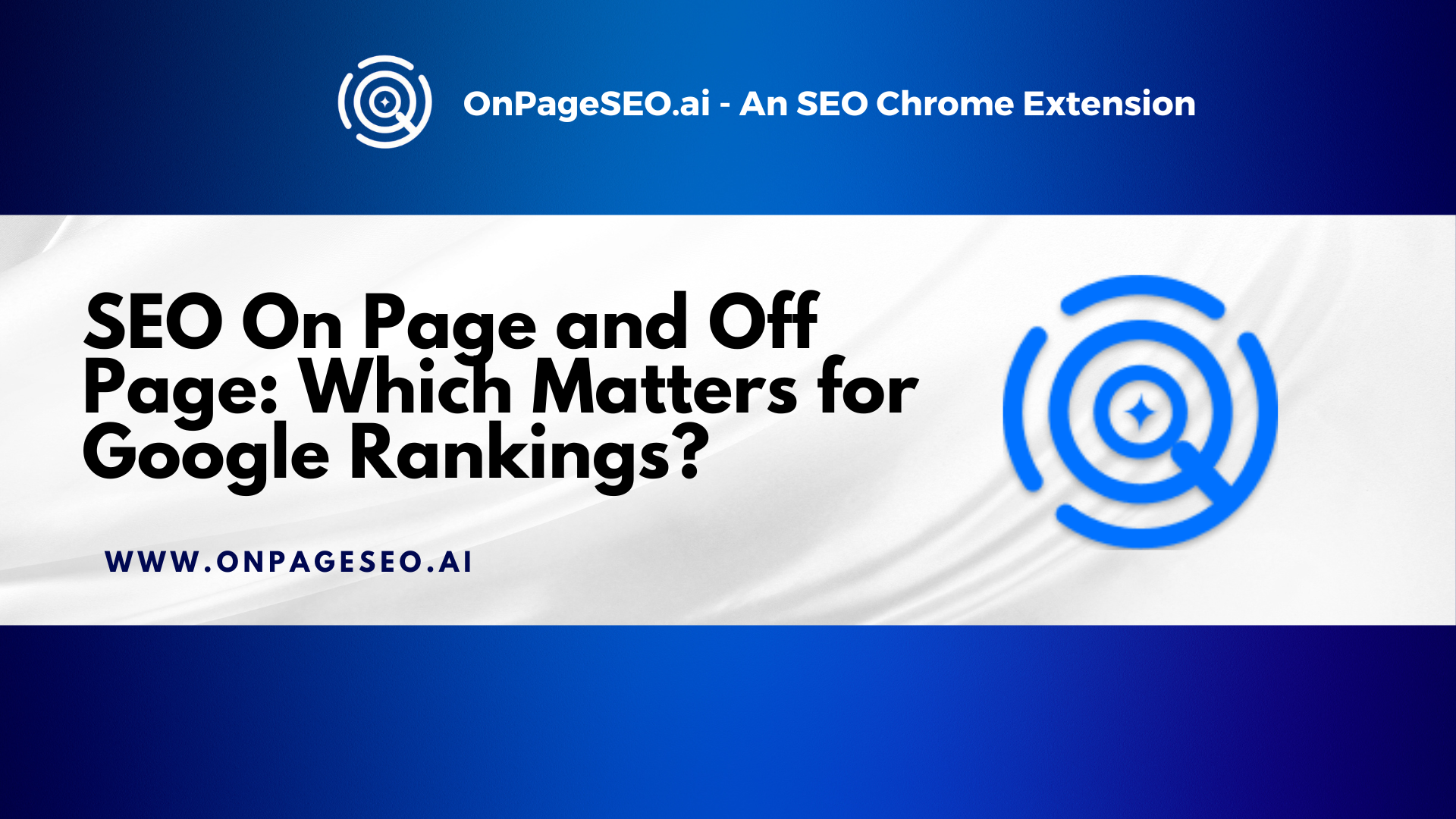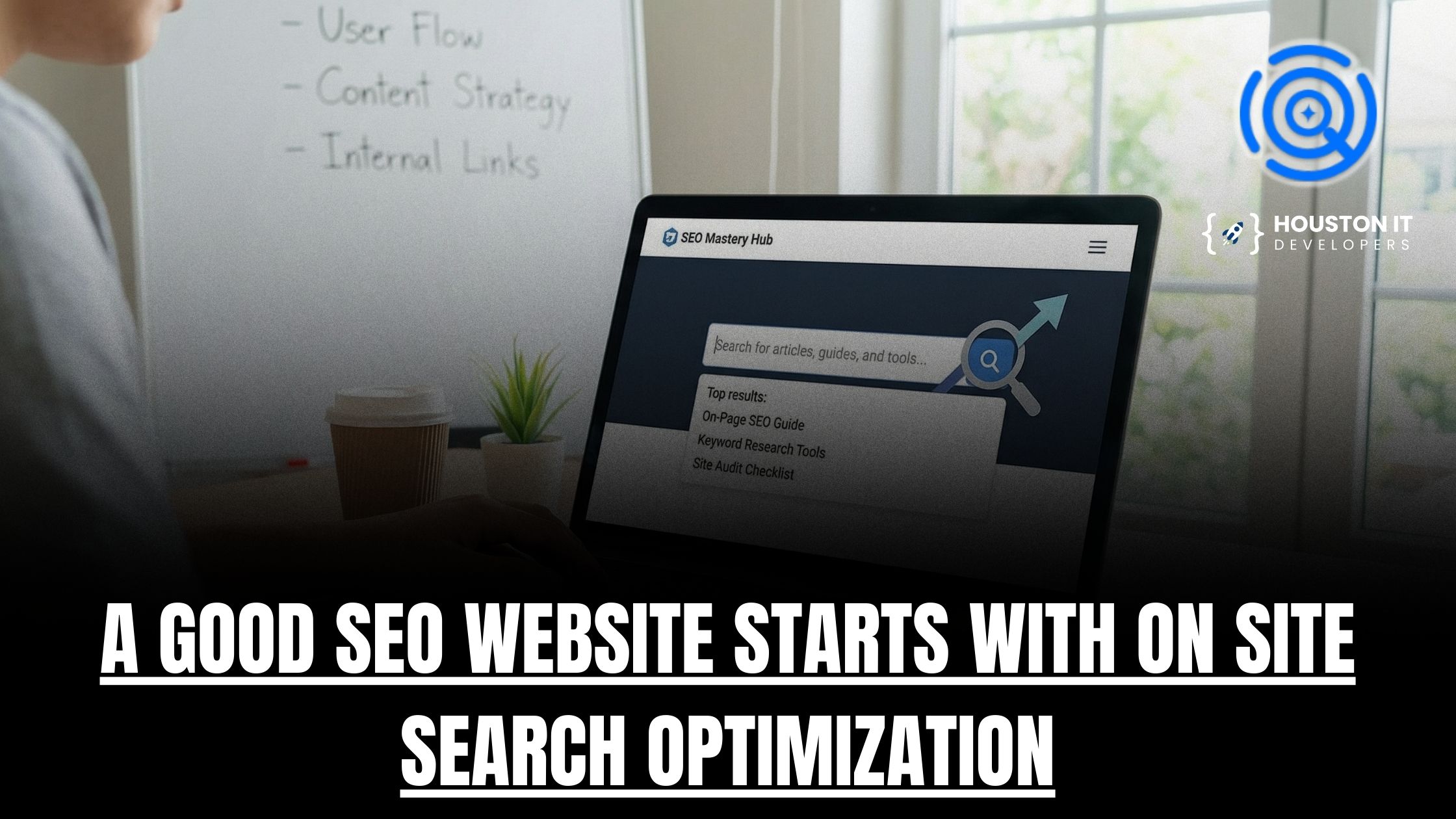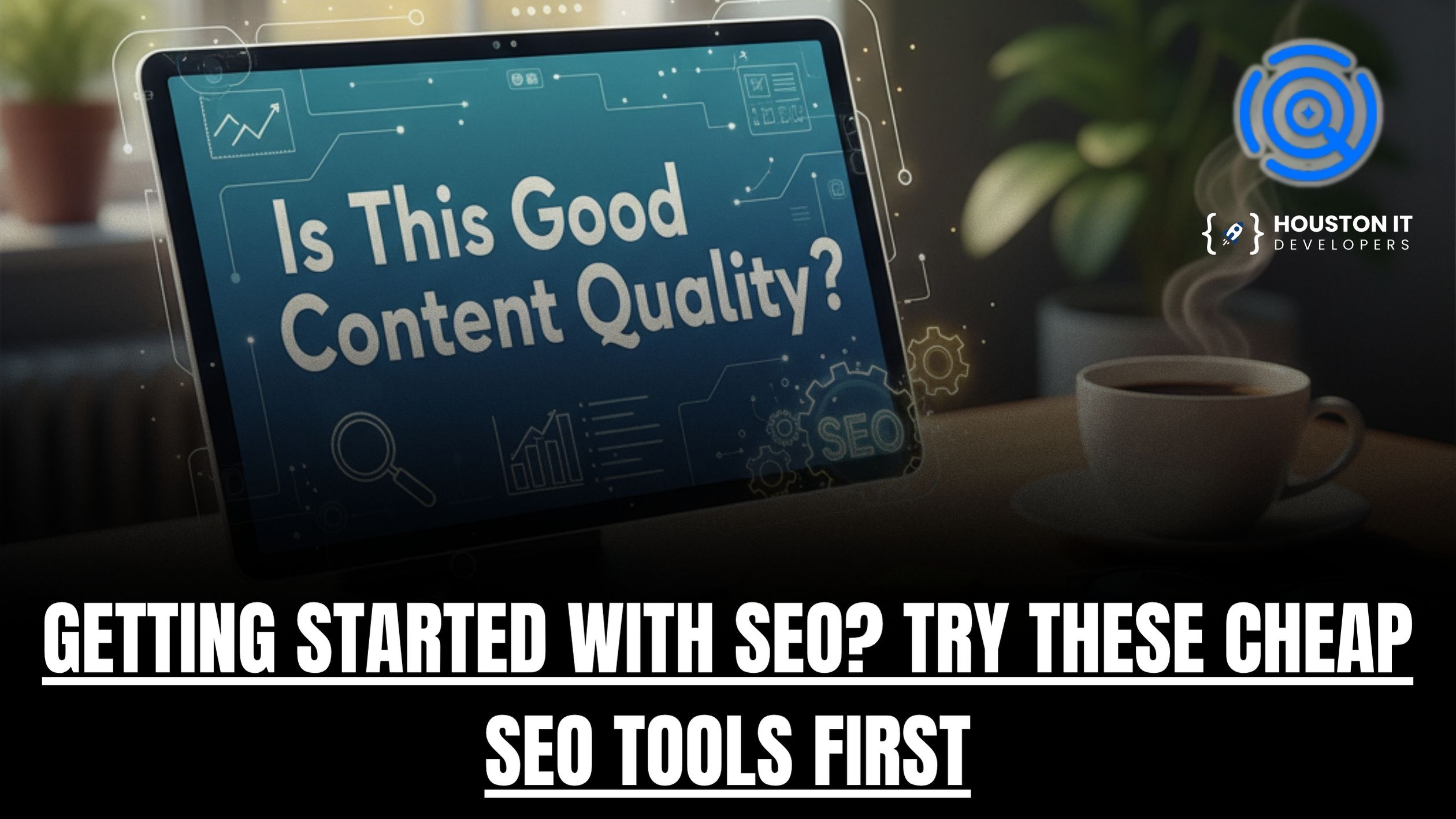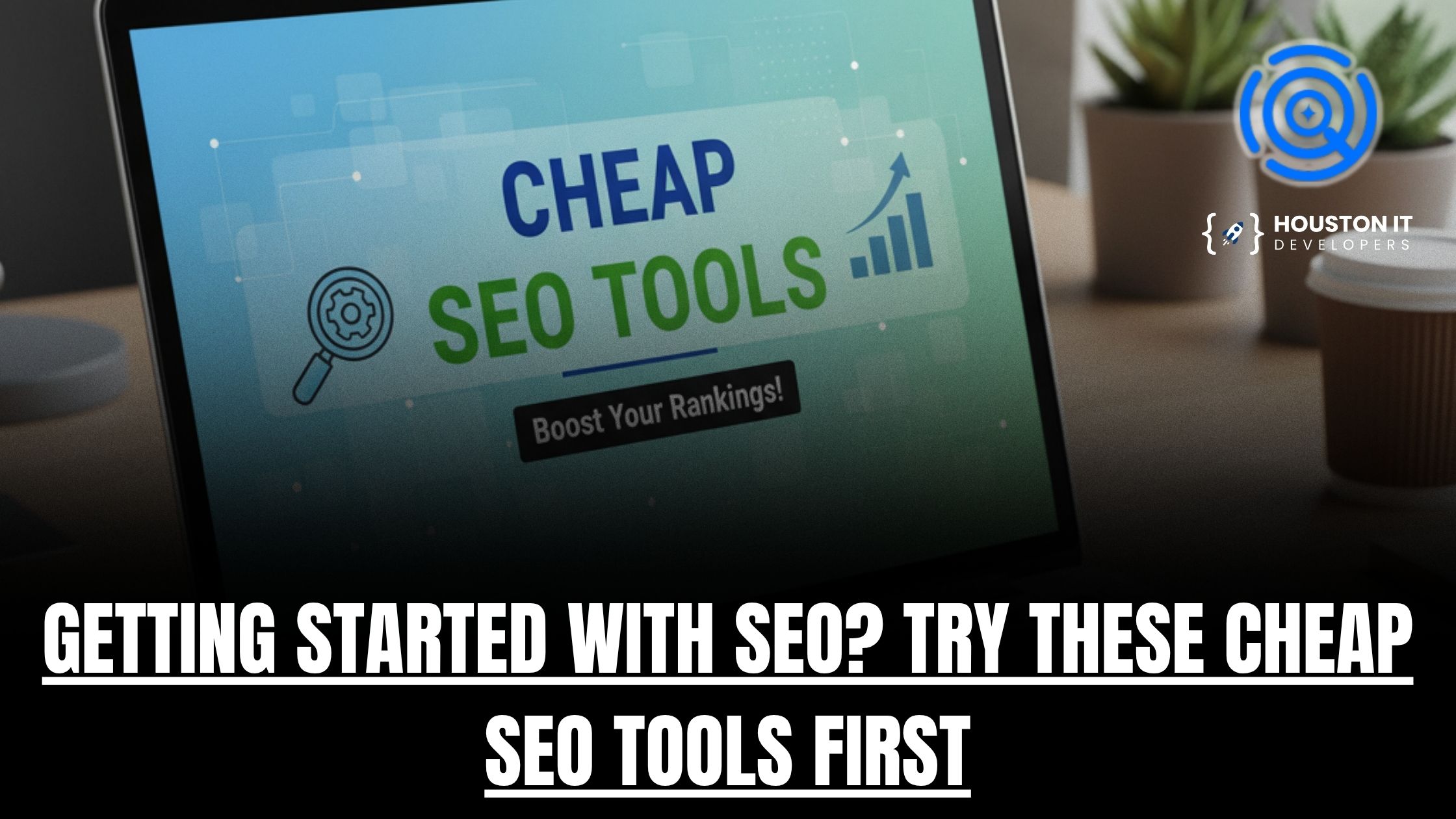Did you know that over 90% of online experiences begin with a search engine? With nearly 44% of companies actively investing in SEO, competition for top Google rankings is fierce. But when it comes to SEO on page and off page, which has a greater impact?
Some marketers believe on-page SEO—optimizing content, meta tags, and site structure—is the key to ranking success. Others argue that off-page SEO—backlinks, brand mentions, and social signals—carries more weight. The reality? Both play a crucial role, and neglecting one can hinder your SEO efforts.
In this blog post, we’ll break down on-page vs off-page SEO, explore key SEO ranking factors, and help you find the right balance. Whether you’re wondering, “Does on-page SEO matter more?” or “Does off-page SEO matter more?”, this guide will provide the answers you need.
Understanding On-Page and Off-Page SEO
Before diving into SEO ranking factors, it’s essential to understand the difference between on-page SEO and off-page SEO.
On-page SEO focuses on optimizing elements within your website, such as content, structure, and technical aspects, to improve Google rankings. Meanwhile, off-page SEO involves external factors like backlinks, brand mentions, and social signals that enhance your site’s authority and trustworthiness.
What is On-Page SEO?
On-page SEO refers to the optimization of elements directly within your website to improve its visibility in Google rankings. It involves refining content, structure, and technical aspects to ensure search engines can easily crawl and index your pages.
Key on-page SEO factors include:
- Content quality and keyword optimization – Ensuring content is relevant, engaging, and incorporates targeted keywords naturally.
- Meta tags, title tags, and headers – Structuring content with SEO-friendly titles and descriptions to improve click-through rates.
- URL structure and internal linking – Creating logical site navigation to enhance user experience and distribute link equity.
- Technical aspects – Improving page speed, mobile-friendliness, and security (HTTPS) to meet ranking requirements.
The importance of on-page SEO for Google cannot be overstated. Without a well-optimized website, even strong off-page SEO efforts may fail to yield results. This is why the on-page vs off-page SEO debate often begins with ensuring a solid foundation.
What is Off-Page SEO?
Off-page SEO are the actions taken outside of your website to enhance its credibility, authority, and relevance in Google rankings. Unlike on-page SEO, which focuses on optimizing content and technical elements, off-page SEO is about building trust and demonstrating your site’s value to search engines and users.
Key off-page SEO factors include:
- Backlinks from authoritative websites – High-quality links signal to Google that your content is valuable and worth ranking higher.
- Brand mentions across the web – Even without direct links, mentions of your brand help establish authority and relevance.
- Social media signals and engagement – Shares, likes, and comments contribute to visibility and indirectly impact rankings.
- Domain authority and trustworthiness – A strong backlink profile and positive reputation improve search visibility.
The importance of off-page SEO for Google lies in determining whether a website is reputable and deserving of a top position. While on-page SEO builds a strong foundation, off-page SEO reinforces trust and authority, making it a crucial part of SEO on page and off page strategies.
Key Factors of On-Page SEO
When it comes to SEO on page and off page, a well-optimized on-page SEO foundation is non-negotiable. Google rankings depend on how well a website is structured, how relevant its content is, and how efficiently it delivers information to users.
While off-page SEO builds credibility, on-page SEO ensures search engines can properly understand and rank your pages.
Content Optimization
At the core of on-page SEO is content—Google prioritizes high-quality, informative, and original material that provides real value. To maximize your content’s impact:
- Use targeted keywords naturally in headings, subheadings, and throughout the body text to improve relevance.
- Implement structured data (schema markup) to help search engines understand the content context.
- Optimize images with alt text and compression for faster loading speeds, enhancing both user experience and SEO.
Without strong content optimization, even the best off-page SEO efforts will struggle to yield results.
Technical SEO Elements
Technical SEO is the backbone of on-page SEO, ensuring that a website is accessible, fast, and secure. Key technical factors include:
- Site speed – Faster websites not only improve Google rankings but also reduce bounce rates.
- Mobile-friendliness – With mobile-first indexing, responsive design is crucial for visibility.
- Crawlability and indexing – Proper use of XML sitemaps and robots.txt ensures search engines can efficiently navigate and rank pages.
- HTTPS encryption – Secure websites build trust with both users and Google, leading to better rankings.
Technical SEO is a non-negotiable component of any on-page SEO strategy, directly influencing Google rankings and user experience.
User Experience Signals
Google’s algorithms prioritize websites that deliver a seamless and engaging user experience (UX). UX-related SEO ranking factors include:
- Low bounce rates – A sign that visitors find content relevant and useful.
- Easy navigation and clear site structure – Enhances engagement and reduces frustration.
- Core Web Vitals – Google’s key metrics measuring loading speed, interactivity, and visual stability.
The importance of on-page SEO for Google cannot be overstated—it sets the foundation for everything else. While some may ask, “Does on-page SEO matter more?”, the reality is that without strong on-page SEO, even aggressive off-page SEO strategies won’t deliver sustainable results.
Key Factors of Off-Page SEO
While on-page SEO lays the groundwork for visibility, off-page SEO plays a critical role in establishing a website’s authority, trustworthiness, and Google rankings. Search engines evaluate off-page SEO signals to determine whether a website is reputable and deserves a higher ranking than its competitors.
Without strong off-page SEO, even a perfectly optimized site may struggle to outperform competitors in search results.
Backlinks and Link Building
Backlinks remain one of the most influential SEO ranking factors in both on-page vs off-page SEO strategies. Google views backlinks as votes of confidence—when authoritative websites link to yours, it signals credibility and relevance. To maximize the impact of backlinks:
- Secure high-quality links from authoritative and relevant websites to strengthen trust.
- Engage in guest blogging and digital PR to earn natural links and boost visibility.
- Avoid spammy or low-quality backlinks, as they can lead to Google penalties and negatively impact rankings.
When done right, link building not only enhances Google rankings but also drives organic traffic and improves overall online reputation.
Brand Mentions and Social Signals
SEO on page and off page extends beyond link building. Search engines also track brand mentions and social engagement to assess a site’s credibility. Important factors include:
- Brand mentions (linked and unlinked) – When your brand is referenced on reputable sites, Google sees it as a sign of authority.
- Social media engagement – Shares, likes, and discussions can increase visibility and indirectly influence rankings.
- Positive reviews and online reputation – Customer feedback contributes to perceived trustworthiness, impacting search rankings.
Strong off-page SEO isn’t just about backlinks—it’s about creating an influential brand presence across multiple platforms.
Trust and Authority Metrics
Google prioritizes sites that demonstrate E-E-A-T (Experience, Expertise, Authoritativeness, and Trustworthiness). This means:
- Websites with high domain authority tend to rank better, as they are seen as industry leaders.
- Consistent content publishing signals expertise and reliability in a niche.
- Citations from reputable sources enhance credibility, reinforcing trust with both users and search engines.
The importance of off-page SEO for Google lies in its ability to validate a website’s reputation. While some may ask, “Does off-page SEO matter more?”, the reality is that a strong off-page SEO strategy, when combined with solid on-page SEO, creates the best foundation for long-term search success.
However, SEO doesn’t stop there—technical SEO and content SEO also play a crucial role in optimizing your website for better rankings. Learn how these elements compare in this detailed guide: Technical SEO vs. Content SEO.
Which One Matters More for Google Rankings?
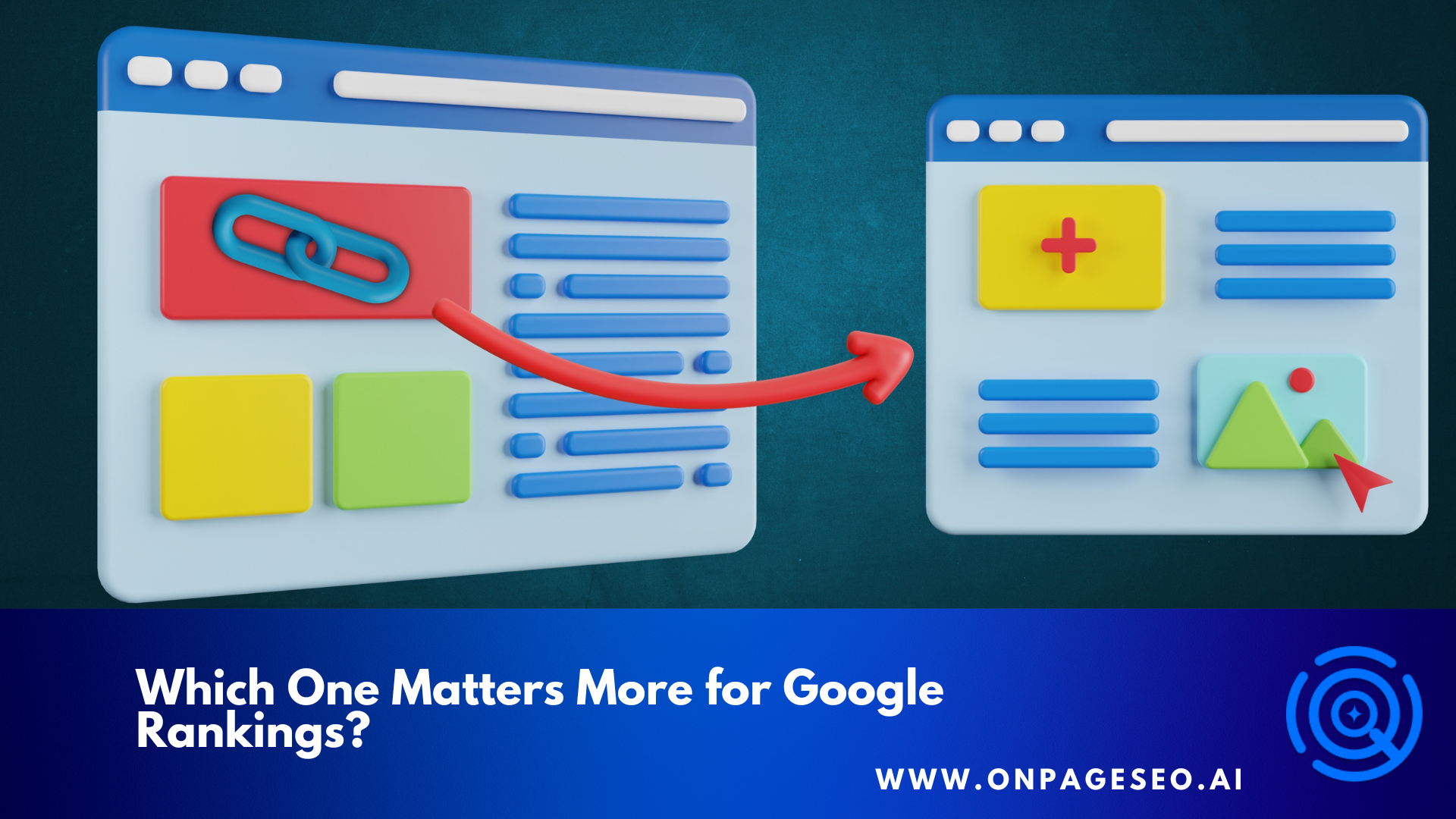
The on page vs off page SEO debate isn’t about choosing one over the other—it’s about understanding how both contribute to Google rankings.
While on-page SEO ensures that your website is optimized for search engines and users, off-page SEO builds the credibility and trust needed to compete in search results. A well-rounded approach to SEO on page and off page is essential for long-term success.
Google’s Ranking Priorities
Google’s algorithm evaluates hundreds of SEO ranking factors, but it places significant weight on both on-page and off-page SEO:
- Without strong on-page SEO, off-page SEO efforts (like backlinks) won’t be as effective because search engines prioritize well-structured, high-quality content.
- Without off-page SEO, even the best-optimized pages may struggle to rank, as Google assesses external signals like backlinks and brand mentions to determine authority.
- Google prioritizes relevance (on-page SEO) and authority (off-page SEO) together, making both essential for ranking success.
Rather than focusing on “does on page SEO matter more” or “does off page SEO matter more”, businesses should integrate both for a comprehensive strategy.
Finding the Right Balance
A winning SEO strategy isn’t about choosing between on-page SEO and off-page SEO—it’s about balancing both effectively:
- Prioritize on-page SEO first to create a solid foundation with high-quality content, optimized keywords, and strong technical performance.
- Implement off-page SEO by building high-quality backlinks, increasing brand mentions, and improving social engagement to enhance credibility.
- Monitor Google updates and adjust strategies accordingly, as search engine algorithms continuously evolve.
Striking the right balance between on-page and off-page SEO is key to improving Google rankings and maintaining long-term search visibility. Learn more about optimizing your strategy in this guide: DIY SEO vs. Professional On-Page SEO Services.
Boost Your On-Page SEO with the OnPageSEO.ai Chrome Extension

The OnPageSEO.ai Chrome Extension is essential for anyone serious about SEO on Page and Off Page success. Google’s algorithm evaluates both on-page SEO and off-page SEO factors, but without a well-optimized website, even strong off-page SEO efforts may fall short. This tool provides instant insights, AI-driven recommendations, and real-time audits, helping you fine-tune your site’s meta tags, headers, links, images, and keyword usage.
- Instant SEO Audit – Get AI-powered insights and a health score with one click.
- Title & Meta Description Generator – Create optimized titles and meta descriptions instantly.
- Header Structure & Link Audit – Analyze H1-H6 headers and internal/external links with color-coded suggestions.
- Image & Keyword SEO Analysis – Improve alt-text, optimize images, and track keyword distribution.
- Pro Plan ($19.99/month) – Unlock unlimited AI-powered recommendations, full Google Search Console insights, and exclusive updates.
Start your 7-day free trial today! Get it on the Chrome Web Store.
FAQs
What is SEO on-page and off-page?
On-page SEO refers to optimizing elements within your website, such as content, meta tags, and internal links. Off-page SEO involves external factors like backlinks, brand mentions, and social signals to boost credibility and Google rankings.
What is the difference between onsite and offsite SEO?
Onsite SEO (on-page SEO) focuses on improving website content, structure, and technical aspects, while offsite SEO (off-page SEO) enhances a website’s authority through backlinks, social engagement, and external references.
What is the difference between on-page, off-page, and technical SEO?
On-page SEO optimizes content and website elements, off-page SEO builds credibility through external signals, and technical SEO ensures a site is fast, secure, and crawlable for search engines.
Final Thoughts on SEO On Page and Off Page
Both on-page and off-page SEO are essential for Google rankings—on-page SEO ensures your website is optimized, while off-page SEO builds credibility and authority. Ignoring either can limit your success.
To improve your rankings, start by optimizing your content, meta tags, and technical elements. Then, strengthen your off-page SEO with high-quality backlinks, brand mentions, and social engagement.
Want to make SEO easier? The OnPageSEO.ai Chrome Extension provides AI-powered audits, title and meta tag optimization, header and link analysis, and keyword insights—all in one tool.
Start your 7-day free trial today! Unlock instant SEO insights and boost your rankings. Get it now on the Chrome Web Store.
